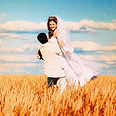Israeli women might differ in religious views, but when in comes to saying "I do" most women agree the perfect age is in their mid-twenties.
A new poll conducted in Israel by Maagar Mochot for the national religious women's organization, Emunah, surveyed 553 women (maximum sampling error: 4.5%). According to statistics, 87% of haredi women believe the "right age" for marriage is 22, national-religious women feel 24 is preferable, whereas secular women stated 26 is the right age to walk down the aisle.
Reuniting
Associated Press
Gross, originally from Romania, saw a newspaper article about Greenbaum's Army unit being at Dachau when it was liberated April 29, 1945
When asked whether living together prior to marriage helps stabilize the relationship once married, the majority of secular women (78%) believed it does. However both haredi (85%) and national-religious (59%) women claimed otherwise.
Women of all factions agreed that faith and maintaining a traditional-religious lifestyle contribute to the stabilization of the family unit: 55% of seculars, 94% of religious and 100% of national-religious women.
Why say 'I do'?
According to the poll, 53% of married or divorced women believe the main reason to marry someone is the desire to live with a man you love. Secular women (58%) believe this to be the main reason to get married, whereas only 41% of national-religious women and 28% of haredi women agreed.
Other main reasons for walking down that aisle include the desire to have children (9%), wanting to settle down (9%) and social norms (7%). Haredi women, more than other factions, expressed their desire to settle down (17%) and have kids (15%) as reasons for marriage. National-religious women stressed family pressure (17%) and desire to get away from their nuclear family (11%) as reasons for wedlock.
Survey shows that even in the case of separation, most divorcees or separated women (81%) do not regret dissolving their marriage, with only 5% expressing regret over their decision.
The poll also examined women's approach to visiting the mikveh. While 43% of seculars believed it was a humiliating and negative experience, more than 80% of haredi and national-religious women described their visits as "a positive spiritual experience."

Illustration
Photo: shutterskock
מומלצים















